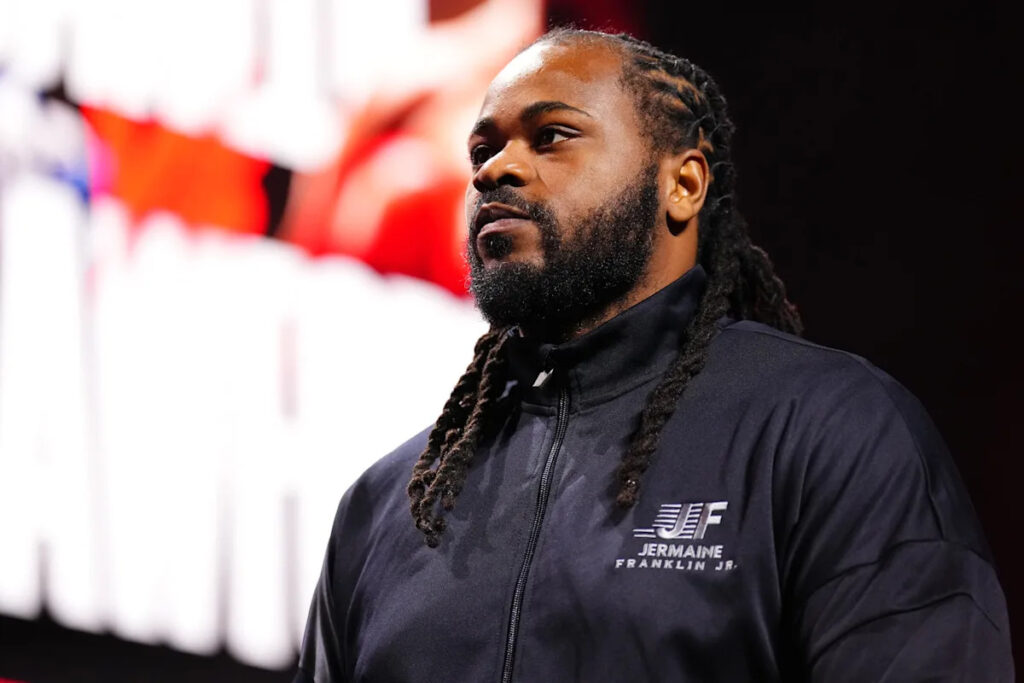LAS VEGAS — “I want to show that we’re still in the conversation!”
Jermaine Franklin’s words to Uncrowned this week punctuate what Americans have long known: The days when the United States ruled heavyweight boxing are long gone. And, as one analyst put it to us, they may never, ever return.
Advertisement
On the undercard of the event headlined by Saul “Canelo” Alvarez vs. Terence Crawford at Allegiant Stadium on Saturday night, Franklin (23-2, 15 KOs) has a chance to claw back some ground in a division where international fighters have seized control.
Franklin’s résumé includes a 2014 Golden Gloves title and a 21-fight unbeaten run as a pro. But that hot streak snapped in 2022 and 2023, when his trips to London ended in consecutive defeats to Dillian Whyte and Anthony Joshua.
The losses reinforced a cold truth that’s been building for years, if not decades — America has rapidly fallen from grace at heavyweight. This weekend, Ivan Dychko (14-0, 13 KOs) is tasked with reinforcing that point.
As a two-time bronze medal winner from the 2012 and 2016 Olympic Games, the Kazakh shared the ring with Joe Joyce, Bakhodir Jalolov, Tony Yoka, Anthony Joshua and Filip Hrgovic before he’d even laced up gloves for a professional six-rounder.
Advertisement
Dychko is used to big international bouts as an amateur, but now faces the toughest professional test of his career to date in Franklin.
“I’m from Kazakhstan and I’m a good heavyweight,” he told Uncrowned in a matter-of-fact tone. “It’s time,” he said, to show that to the world.
Dychko appears determined to follow his countryman Gennadiy Golovkin to global stardom, and join the post-Soviet lineage of heavyweight kings — from the Klitschko brothers to Oleksandr Usyk — who ruled the heavyweight boxing world like Americans once did. And it’s not just the Klitschkos and Usyk. Tyson Fury’s 2-0-1 record over Deontay Wilder showed skill could tame America’s most concussive puncher. Joshua beat American hopefuls Dominic Breazeale and Charles Martin. Even Scotland-based Congolese fighter Martin Bakole battered the much-hyped Jared Anderson in five rounds last year. The list goes on.
Advertisement
“I want to put us back on the map,” Franklin told Uncrowned. “And I’ll show that on [September] 13th. I’ll fight a good fight, a sharp fight, and I’m going to shock the world.”
It would be a shock, too. Because history, recent results, and the global talent pool all suggest it will be otherwise.
Boxing analyst Max Kellerman explained to Uncrowned this week that there’s a reason international heavyweights have lapped the U.S., and it comes down to the gridiron proving to be a greater lure than the ring.
The heavyweights here have gone to “American football, mainly,” Kellerman said.
“And that has meant that it’s unlikely that you’ll get great American heavyweights like you used to, and the proportion that you used to, with the rest of the world.”
Opponents Ivan Dychko and Jermaine Franklin Jr. face off during the Canelo vs. Crawford undercard press conference at T-Mobile Arena in Las Vegas, Nevada.
(Ed Mulholland via Getty Images)
From the late 19th-century bare-knuckle champion John L. Sullivan through to the middle of the 20th century, the heavyweight division was overwhelmingly American. There was Jack Johnson, Jack Dempsey and Joe Louis — the list reads like the sport’s pantheon.
Advertisement
There were only a handful of outliers over that 115-year span — Bob Fitzsimmons of England, Ingemar Johannson of Sweden, Primo Carnera of Italy, Tommy Burns of Canada, and, later, Lennox Lewis of England. But nearly nine out of every 10 heavyweight champions in more than a century of prizefighting were American.
From the 1960s to 1990s, the U.S. continued to dominate through iconic champions like Muhammad Ali, Joe Frazier, George Foreman, Larry Holmes, Mike Tyson and Evander Holyfield.
Then the balance shifted. After Lewis closed the century, the Klitschko brothers from Ukraine ruled the 2000s. The international reign continued with Fury, Joshua, Alexander Povetkin, Joseph Parker, Andy Ruiz, and now Usyk. Wilder was America’s main outlier in this period.
From 2000 to today, about 70% of heavyweight kings have been international fighters. The U.S., once dominant, has been reduced to around 30%. And that gap could widen.
Advertisement
For Kellerman, the reason is simple: America’s biggest athletes now play ball rather than box.
“European sports don’t select out for size the way American sports do,” Kellerman said. “Especially with football.”
“So you’re more likely to see this ratio of dominance from Europe, and other parts of the world, compared to the dominance from American heavyweights from the past.”
Franklin insists he can shock the world, but history suggests otherwise.
Unless the U.S. finds a way to lure its biggest men back into boxing, the crown will remain on international heads. And Dychko could be the next to prove it.
Read the full article here



